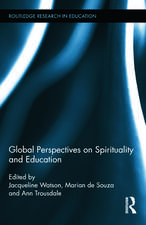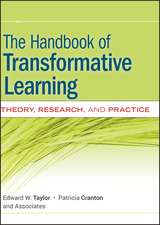Moral Education in sub-Saharan Africa: Culture, Economics, Conflict and AIDS
Editat de Sharlene Swartz, Monica Tayloren Limba Engleză Paperback – 14 oct 2024
The volume provides sociological tools for understanding the lived morality of those marginalised by poverty, and analyses the effects of culture, religion and modern secularisation on moral education. With contributions from fourteen African scholars, this book challenges dominant frameworks, and begins conversations for mutual benefit across the North-South divide. It has global implications, not just, but especially, where moral education is undertaken in pluralist contexts and in the presence of economic disparity.
This book was published as a special issue of the Journal of Moral Education.
| Toate formatele și edițiile | Preț | Express |
|---|---|---|
| Paperback (1) | 250.16 lei 6-8 săpt. | |
| Taylor & Francis – 14 oct 2024 | 250.16 lei 6-8 săpt. | |
| Hardback (1) | 708.32 lei 6-8 săpt. | |
| Taylor & Francis – 23 feb 2011 | 708.32 lei 6-8 săpt. |
Preț: 250.16 lei
Preț vechi: 302.05 lei
-17% Nou
Puncte Express: 375
Preț estimativ în valută:
47.87€ • 49.70$ • 39.92£
47.87€ • 49.70$ • 39.92£
Carte tipărită la comandă
Livrare economică 22 martie-05 aprilie
Preluare comenzi: 021 569.72.76
Specificații
ISBN-13: 9781032929972
ISBN-10: 1032929979
Pagini: 152
Dimensiuni: 174 x 246 mm
Greutate: 0.28 kg
Ediția:1
Editura: Taylor & Francis
Colecția Routledge
Locul publicării:Oxford, United Kingdom
ISBN-10: 1032929979
Pagini: 152
Dimensiuni: 174 x 246 mm
Greutate: 0.28 kg
Ediția:1
Editura: Taylor & Francis
Colecția Routledge
Locul publicării:Oxford, United Kingdom
Public țintă
Academic and PostgraduateCuprins
1. Introduction: The pain and the promise of moral education in sub-Saharan Africa Sharlene Swartz 2. The African ethic of Ubuntu/Botho: implications for research on morality Thaddeus Metz and Joseph Gaie 3. The death of democracy and the resurrection of timocracy Mogobe B. Ramose 4. ‘Moral ecology’ and ‘moral capital’: tools towards a sociology of moral education from a South African ethnography Sharlene Swartz 5. Continuity and change in the development of moral education in Botswana Yonah H. Matemba 6. Moral education in a post-conflict context: the case of Burundi Herménégilde Rwantabagu 7. Post-conflict teacher development: facing the past in South Africa Gail Weldon 8. ‘Deceptive’ cultural practices that sabotage HIV/AIDS education in Tanzania and Kenya Mary Oluga, Susan Kiragu, Mussa Mohamed and Shelina Walli 9. Recent work in African ethics Thaddeus Metz 10. The moral tensions of HIV/AIDS in sub-Saharan Africa Julia De Kadt, Tawanda Makusha and Linda Richter
Notă biografică
Sharlene Swartz is a sociologist and senior research specialist at the Human Sciences Research Council in South Africa, and a visiting research fellow at the University of Cambridge. She holds a masters degree from Harvard University and a PhD in the sociology of education from the University of Cambridge.
Monica Taylor is a philosopher who has worked in a national educational research organisation in the UK and has edited the Journal of Moral Education for 35 years. She is currently a Research Associate at the Institute of Education, University of London and the President of the Asia Pacific Network for Moral Education.
Monica Taylor is a philosopher who has worked in a national educational research organisation in the UK and has edited the Journal of Moral Education for 35 years. She is currently a Research Associate at the Institute of Education, University of London and the President of the Asia Pacific Network for Moral Education.
Descriere
This book challenges prevailing and dominant Global North frameworks on moral education by showing how an African perspective may be employed to address seemingly intractable problems such as the legacies of ethnic conflict, genocide, Apartheid, poverty and HIV/AIDS.
This book was published as a special issue of the Journal of&nb
This book was published as a special issue of the Journal of&nb













